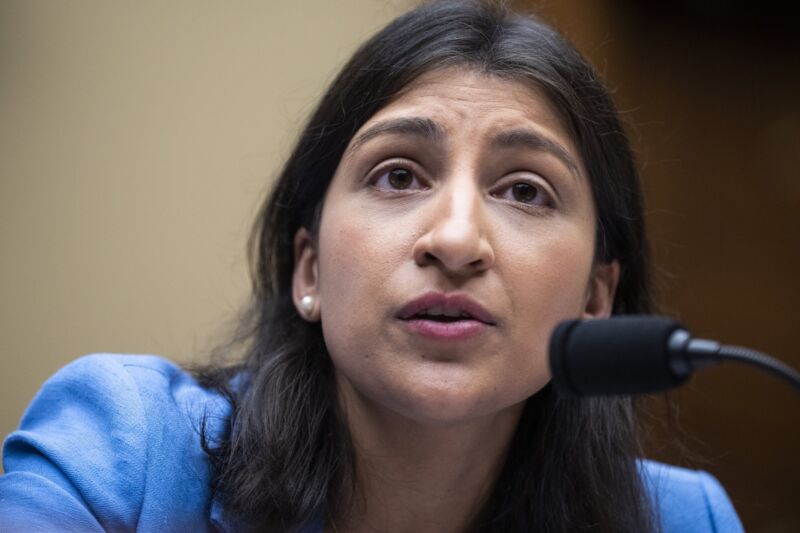
The Federal Trade Commission is preparing to file a major antitrust lawsuit accusing Amazon of "leverag[ing] its power to reward online merchants that use its logistics services and punish those who don't," Bloomberg reported today. Bloomberg described the forthcoming lawsuit as "the big one," following several earlier lawsuits filed by the FTC under Chair Lina Khan.
"In the coming weeks, the agency plans to file a far-reaching antitrust suit focused on Amazon's core online marketplace, according to documents reviewed by Bloomberg and three people familiar with the case," the report said.
Khan may try to force Amazon to "restructure" its business. "Based on her public comments, Khan is unlikely to accept compromises from Amazon and could seek to restructure the company—a dramatic outcome that Amazon would surely appeal," Bloomberg wrote.
Amazon declined to comment when contacted by Ars today.
FTC filed three other lawsuits against Amazon
Khan was known as a critic of Amazon before becoming FTC chair in 2021. In 2017, Khan wrote a Yale Law Journal article titled "Amazon's Antitrust Paradox," which argued for a more aggressive approach to antitrust enforcement to counter "Amazon's dominance."
The FTC sued Amazon last week, claiming it violated US law by tricking consumers into signing up for the $14.99-per-month Amazon Prime subscription service and making it exceedingly difficult to cancel. In the Prime case, the FTC is seeking a permanent injunction, civil penalties, and other monetary relief.
The FTC also recently filed one privacy lawsuit against Amazon with allegations related to kids' Alexa voice recordings and another with allegations that Amazon's Ring division invaded users' privacy by "allowing thousands of employees and contractors to watch video recordings of customers' private spaces." In both cases, Amazon agreed to settlements requiring financial penalties and changes to privacy practices.
As for the upcoming "big one," Bloomberg wrote that "FTC investigators and Khan's office have been honing the complaint for several months... and finalizing key details such as where to file suit." The FTC can file complaints in either federal court or in the FTC's own administrative process. Suing in a federal court "would avoid drawn-out litigation on whether Khan has a conflict of interest, but could make the case harder to win," the Bloomberg article said.
In June 2021, Amazon petitioned the FTC to have Khan recuse herself from antitrust investigations into the company because of her previous public statements criticizing Amazon and later accused Khan's FTC of "harassing" its top executives. The Meta-owned Facebook also sought Khan's recusal. She has rejected such requests despite a recommendation from an FTC ethics official to recuse herself from adjudicating the Meta case.
Amazon fulfillment takes big chunk of seller revenue
Third-party sellers can rely on Amazon for warehousing, shipping, and other services through the Fulfillment by Amazon (FBA) system, but it takes a big cut out of their revenue. A recent Marketplace Pulse study based on profit and loss statements from a sample of sellers found that "Amazon is pocketing more than 50 percent of sellers' revenue—up from 40 percent five years ago," because "Amazon has increased fulfillment fees and made spending on advertising unavoidable."
"According to P&Ls provided by a sample of sellers, a typical Amazon seller pays a 15 percent transaction fee (Amazon calls it a referral fee), 20–35 percent in Fulfillment by Amazon fees (including storage and other fees), and up to 15 percent for advertising and promotions on Amazon. The total fees vary depending on the category, product price, size, weight, and the seller's business model," Marketplace Pulse wrote in February.
According to Bloomberg's article, the "FTC has amassed evidence that the company disadvantages sellers that don't use these services, and the agency is investigating an algorithm that selects merchants for the web store's coveted 'Buy Box,' where consumers can add products to their cart with one click."
"The expected allegations are similar to a 2020 report from a US House subcommittee—which counted Khan as a staff member—and overlap with a European antitrust case that charged Amazon with rewarding sellers that use its fulfillment services and using merchants' sales data to boost its own retail business," Bloomberg wrote. Amazon agreed to a settlement with the EU in December 2022.
The FTC's current investigation began two years before Khan became chair. "Amazon received the initial investigation notice in June 2019, according to documents viewed by Bloomberg. The first request for records followed two months later," the Bloomberg article said. Upon taking charge in 2021, Khan "personally helped draft some lines of questioning for investigators" and took other actions to beef up the probe into Amazon.
reader comments
154 with